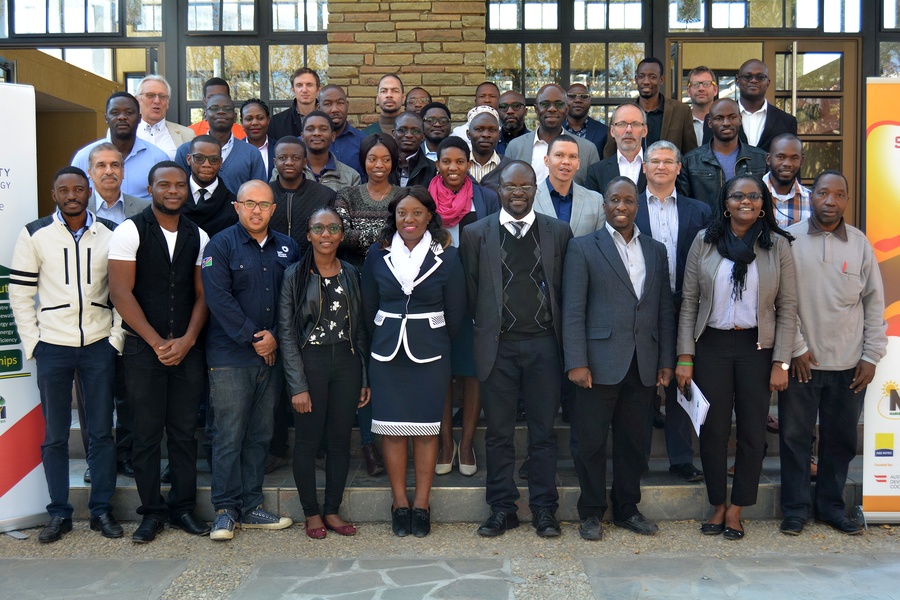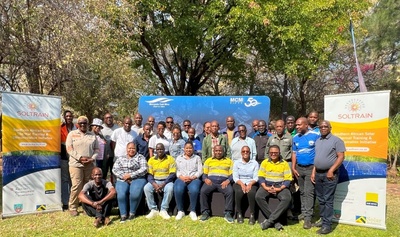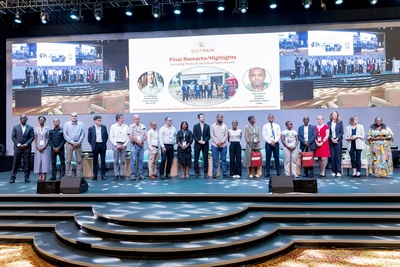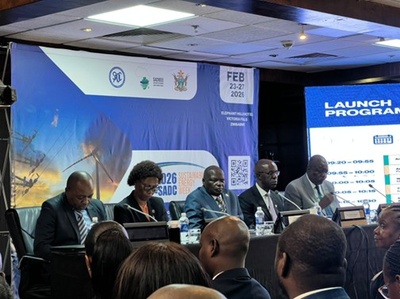Key Stakeholders commit to implement the Solar Thermal Technology Roadmap (Nam-STTR) Implementation Plan at the Final Stakeholder Workshop
Submitted by Fenni Shidhika and Helvi IlekaPublished 8 years, 3 months ago
The Namibia University of Science and Technology (NUST), through the Namibia Energy Institute (NEI), organised the Final Stakeholder Workshop on the Implementation Plan of the Namibia Solar Thermal Technology Roadmap (Nam-STTR) under the Southern African Solar Thermal Training and Demonstration Initiative (SOLTRAIN Project) in collaboration with the Ministry of Mines and Energy (MME). The workshop took place in late June at the NUST hotel school.

The main objectives of the workshop were to present the final draft of the Namibia Solar Thermal Roadmap Implementation Plan and get input from stakeholders. In addition the workshop sought to obtain full commitment and pledges in the implementation of the Roadmap from Key Stakeholders and participating institutions such as Electricity Control Board (ECB), NamPower, Environmental Investment Fund (EIF), Namibia Standards Institute (NSI), National Training Authority (NTA), Ministry of Works and Transport (MoWT), Ministry of Mines and Energy (MME), Renewable Energy Industry Association of Namibia, (REIAoN), National Housing Enterprise (NHE) and the National Commission on Research, Science and Technology (NCRST).
The implementation plan will guide the key stakeholders on various activities, milestones, strategies and timelines in order for Namibia to reach the mission of achieving an installation of 1.5 million m2 of solar thermal collectors installed capacity in Namibia by 2030, which translates to about 0.5 m2 per inhabitant with a thermal output equivalence of approximately 1.05 GWth (based on the international conversion factor of 1 m² = 0.7 kW).
Dr Tjama Tjivikua, the NUST Vice Chancellor in an address delivered on his behalf by Mr Lameck Mwewa, elaborated on the achievements of the SOLTRAIN Project to date. John Titus, the Director of Energy from MME who delivered the speech of the Permanent Secretary of Ministry of Mines and Energy spoke highly of the SOLTRAIN initiative. The impacts of activities and contributions from SOLTRAIN are already evident in Namibia, especially in the work towards the development of Renewable Energy Policy, Demand Side Management Study, Update of the National Energy Policy, the development of the curricula in Universities and in Vocational Training Centres.
Tonateni Amakutuwa from ECB said that ECB commits to offer regulatory support, while Arno Pfohl from NamPower pledged that NamPower will offer technical support. MET underscored Namibia’s commitment to reduce its carbon footprint and gave assurance of its support towards the goal of having 70 % of electricity generated from renewable energy by 2030.
Petrus Muteyauli from MET head of Environmental Economics Unit stated that they are willing to work with the energy industry to submit bankable renewable energy projects to access funds from the Green Climate Fund. Aina- Maria Iteta from the EIF said the stakeholders should strive to own the Nam-STTR. She emphasised that the EIF will continue to make a loan facility for renewable energy available through local banks. Nico Snyders from MME stated that the Renewable Energy Policy and the National Energy Policy spearheaded by the Ministry, which has been recently approved by Cabinet, will enhance the uptake of solar thermal technologies.
Kudakwashe Ndhlukula, the Executive Director for SADC Centre for Renewable Energy and Energy Efficiency (SACREEE) who wants SOLTRAIN to be replicated in all SADC member states, also commited support for the roadmap implementation plan in industrial applications of solar thermal technologies.
Paulus Mungeyi from NCRST said that they will support the roadmap implementation plan on research activities in the energy sector, prioritising renewable energy. Nandaemua Maharero from NSI said that NSI together with the industry will be engaged to review, develop and adopt relevant standards for proper implementation of various technologies.
Harald Schutt from REAIoN stated that they will support the implementation plan of the roadmap in various solar thermal technologies. Christoph Heil from NTA and Gesellschaft Fur Internationale Zusammenarbert (GIZ) presented the initiatives and activities undertaken by NTA and GIZ on the promotion of Vocational Education & Training in Namibia (ProVET) in the implementation of Unit Standards on Solar Technologies at all Vocational Training Centres.
The Implementation plan of the Namibia Solar Thermal Roadmap is divided into two phases and has identified activities and key stakeholders to fast track the implementation of the Roadmap. The first phase, which is the short-term strategy (2017 – 2021), will focus more on awareness, policy support, and training, and pave way for the full scale implementation. This will be done while physically implementing a number of installations.
The planned activities in this phase include carrying out a review of any existing policies and, if necessary, developing relevant policies that may support the smooth implementation the Roadmap, carrying out outreach and public awareness to showcase the benefits of increased solar thermal technology deployment and usage, and encouraging academic institutions to develop training programmes, and implement research programmes to support the sector. The development of possible financing and subsidy mechanisms for the various technologies will be encouraged in this short-term strategy phase.
The second phase which is the long-term strategy (2022 – 2030) will consolidate the activities initiated in the first phase, and some of the tasks in phase 1 will continue into this phase. The full scale deployment of the installations will be emphasized in phase 2, with objective of meeting the set targets. The activities will be monitored by the steering committee, which will receive regular updates from the secretariat (NEI), and systems assessment will be through direct interaction with the key stakeholders. The Roadmap will be continuously updated during actual implementation phase and monitoring and evaluation will form part of the process during the implementation. The entire activities will be overlooked and supervised the Roadmap Steering Committee.










